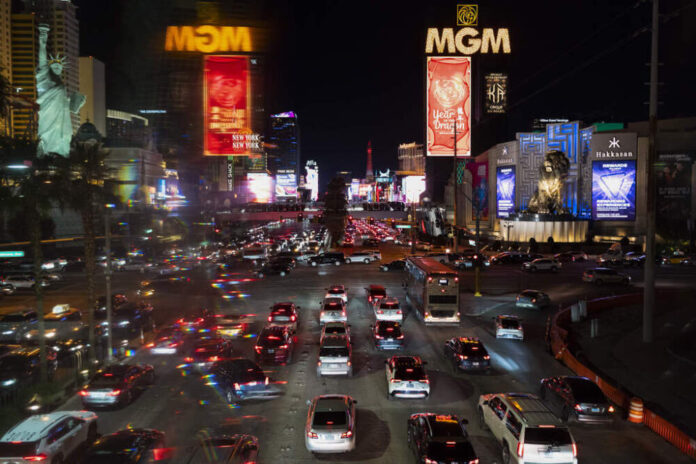Las Vegas, the city of neon lights and endless entertainment, is currently grappling with a notable downturn in tourism. Recent reports indicate a troubling decline in hotel occupancy and air travel, which is significantly affecting the local economy and leading to layoffs or reduced hours for many hospitality employees. An exploration into the factors driving this slump reveals a multifaceted situation, raising questions about whether this iconic city can rebound from its current predicament.
Current Tourism Landscape
Jeremy Aguero, principal analyst at Applied Analysis, has closely monitored Southern Nevada’s economy and the intricate relationship between gambling and tourism for over two decades. He underscores that Las Vegas thrives on tourism, which accounts for a staggering 30% of the area’s GDP and supports hundreds of thousands of jobs.
Tick Segerblom, chairman of the Clark County Nevada Board of Commissioners, echoes this sentiment, highlighting the dependence of the Las Vegas hospitality sector on a steady influx of visitors. This relationship is crucial not only for the economic stability of the region but also for maintaining the livelihood of countless workers.
Declining Numbers
Despite the city’s glittering reputation, recent statistics reveal a significant drop in tourism. Visitors to Las Vegas have decreased for six consecutive months, marking a 12% year-on-year decline in July 2025 compared to the previous year. This downturn extends to airport traffic, hotel occupancy rates, and vehicle counts from nearby California—a primary source of visitors to the city.
Larry Turner, a utility porter at Four Queens Casino, reflects on the shift he’s witnessed during his 16 years in the industry. “We used to stay busy until about three or four in the morning. Now around 1:30, it is dead downtown,” he observes. This sharp decline in foot traffic is worrisome for workers depending on the continuous influx of tourists.
Causes of the Downturn
One widely acknowledged factor contributing to this downturn is the rising cost of visiting Las Vegas. Tourists have expressed frustrations about exorbitant prices for food, drinks, and accommodations. For instance, a bucket of Coors Lights can set visitors back nearly $300, redefining expectations of a fun night out. As one tourist laments, “Let’s talk about a $20 parking fee for an hour. It’s just not tenable.” This sentiment showcases how many perceive Las Vegas as becoming too expensive for a casual getaway, significantly impacting discretionary spending.
To combat this adverse trend, the city has initiated a citywide sale offering discounts on hotels and entertainment, alongside a new ad campaign aimed at attracting visitors back. However, the extent of this slump raises a larger question about consumer attitudes towards spending in today’s economic climate.
The Broader Economic Impact
The declining numbers in Las Vegas are not merely a local issue but reflect broader national economic trends. According to Aguero, the cyclical nature of the economy plays a crucial role. He highlights that after a period of unprecedented economic stimulation—fuelled by $5.3 trillion in federally allocated COVID relief funds—people are now cautious about discretionary spending, creating a chilling effect on consumer activity nationwide.
Diana Valles, president of the Culinary Workers Union Local 226, emphasizes that the impact of reduced tourism disproportionately affects her constituents, who are predominantly Latino immigrants. “There’s a lot of stress, a lot of fear, a lot of uncertainty for our members right now,” she notes, adding that the current political landscape has left many hesitant to travel to the United States.
The Political Climate and Its Effects
Discussion among local officials, including Segerblom and Valles, touches on the repercussions of national policies imposed by the current administration, particularly those affecting immigration and foreign relations. With international visitor numbers, particularly from Canada and Mexico, notably dwindling, some local leaders attribute this drop to geopolitical tensions. “When you declare war against your number one and number two tourism markets,” remarks Segerblom, “it has a tangible impact.”
In light of these challenges, the pressing question remains: can Las Vegas experience a turnaround? Aguero remains optimistic, asserting Las Vegas’s history of resilience. He points to the city’s ability to adapt swiftly—illustrated by the rapid emergence of promotional offerings and package deals in response to the market shift. “Las Vegas has been as resilient and resourceful as any major metropolitan area,” he asserts.
Potential for Recovery
Despite the current challenges, some industry executives are optimistic about the future. Jonathan Jossel, CEO of Plaza Hotel and Casino, has observed a decline in hotel occupancy but believes the city can rebound by shifting back to what made Las Vegas attractive to visitors: affordable and enjoyable experiences without the hefty price tag. Jossel highlights that the messaging around Las Vegas needs to evolve to retain its allure as an affordable entertainment destination.
Steve Hill, President and CEO of the Las Vegas Convention and Visitors Authority, acknowledges the backlash regarding ad campaigns that don’t account for the high costs associated with visiting the city. He emphasizes the need for clarity in communication regarding the value visitors can experience while also responding to market demands through promotions and discounts.
The Road Ahead
As the economy navigates through uncertain waters, the collective efforts of its stakeholders—hotel executives, local business owners, and policymakers—will be vital in shaping the path forward. The unique diverting factors affecting Las Vegas, from rising costs to shifting consumer behavior, illustrate the necessity for continued adaptations. Vanishing tourist volumes could accelerate the urgency to revamp strategies and revive that quintessential Vegas experience known for its magic, excitement, and unbeatable value.
Ultimately, even amid these slow periods, supporters of Las Vegas are hopeful that adaptability and resilience will usher in a new era. History has shown that Las Vegas can set itself up for revival, allowing it to continue captivating visitors from around the globe. Moving forward, it’s about striking the right balance between offering unforgettable experiences and maintaining palpable value to draw tourists back to the Entertainment Capital of the World.
